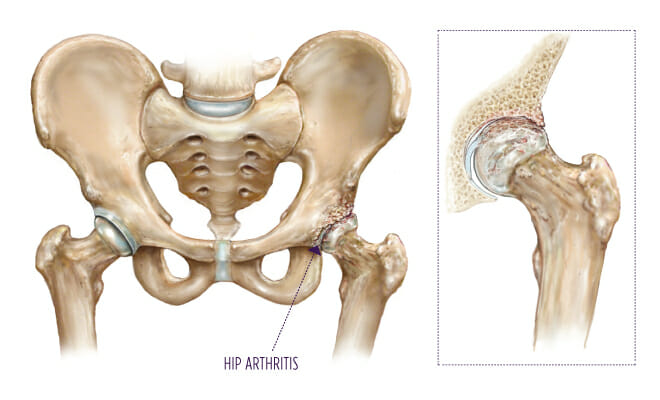What causes hip arthritis?

The hip is composed of two bones, the femur (thigh bone) and the pelvis, that form a ball-and-socket joint. This configuration allows for the range of motion necessary for movement and supports the weight of the body.
The area where these two bones touch is coated in cartilage, which allows the bones to glide smoothly over each other. When a hip joint develops osteoarthritis, this cartilage degenerates, resulting in painful bone-on-bone rubbing, further damage, and bone spurs.
Factors that may contribute to hip arthritis include joint injury, increasing age, and being overweight. Other possible causes of osteoarthritis can include:
- Improperly formed joints
- Genetic (inherited) defects in the cartilage
- Extra stress on joints, either by being overweight or through activities that involve the hip
What are the symptoms of hip arthritis?
Typically, patients with hip osteoarthritis go through a progression of symptoms:
- Initially, the hip may be stiff and painful with certain movements, and pain in the groin develops
- This pain and stiffness may be most noticeable in the morning, during activity, or after sitting for an extended period of time
- Eventually, inflammation and painful grinding develops
- The hip may become so uncomfortable that it wakes you up at night
How is hip arthritis diagnosed?
A thorough physical exam and X-rays are crucial to diagnosing hip arthritis. X-rays allow your physician to see the bony anatomy of the hip and, in conjunction with your symptoms, help to determine the extent of your arthritis.
How is hip arthritis treated nonsurgically?
The severity of your osteoarthritis will determine the best treatment plan for you. Your physician may recommend any of the following to help relieve your symptoms:
Anti-inflammatory medication
Oral anti-inflammatories may be effective at decreasing inflammation due to injury. However, some people suffer from side effects while taking them. If you experience anything unusual when taking these medications, contact your physician immediately to determine if continued use is appropriate.
Physical therapy
Your physician may prescribe several sessions with a physical therapist to increase your range of motion and strength and decrease your pain. After several visits, your therapist may recommend a home exercise program to help maintain any gains you have achieved during therapy.
Activity modification
Patients with hip arthritis typically have to undergo some lifestyle modifications. If specific activities make your symptoms worse, then avoiding those activities can provide relief. Low-impact exercise such as cycling, elliptical, swimming, and light strength training are the best options.
Steroid injections
A steroid injection places anti-inflammatory medication directly inside the joint. This can result in dramatic and potentially long-term relief of pain and swelling.
In order to ensure that the medication is placed directly into the joint, your physician may recommend the injection be done under X-ray or ultrasound.
What are the surgical treatment options for hip arthritis?
In severe cases of arthritis, surgery may be the best treatment option.
Total hip replacement
In this procedure, diseased and damaged cartilage and bone are removed and replaced with artificial components. The techniques and prosthetics used in this surgery have made significant advances over the past decade. Patients who undergo a total hip replacement are getting more use out of their new joint than ever before.
Together, you and your physician will decide on the most appropriate treatment to provide you with maximum relief.
Learn more about total hip replacement.
How can I prevent hip osteoarthritis?
There are things you can do to reduce the risk of developing hip osteoarthritis. The less stress you put on your joints, the less likely they are to wear out prematurely. Try to:
- Maintain a healthy weight
- Exercise to strengthen muscles around joints
- Use good posture
- Rest if joint pain starts to bother you
- Start new activities slowly and safely until you know how your body will react
When to seek treatment for your arthritis
Arthritis doesn’t have to spell the end of an active life. If you are experiencing worrisome symptoms or persistent pain, the renowned arthritis specialists at Summit Orthopedics can help. We work with you to confirm a diagnosis and develop an appropriate conservative treatment plan. If nonsurgical treatments fail to support your lifestyle goals, fellowship-trained orthopedic surgeons will consult with you and discuss appropriate surgical options. Summit is home to innovative joint replacement options. Our Vadnais Heights Surgery Center is one of a select few nationally to receive The Joint Commission’s Advanced Certification for Total Hip and Total Knee Replacement.
Start your journey to healthier joints. Find your arthritis expert, request an appointment online, or call us at (651) 968–5201 to schedule a consultation.
Summit has convenient locations across the Minneapolis-St. Paul metro area, serving Minnesota and western Wisconsin. We have state-of-the-art centers for comprehensive orthopedic care in Eagan, MN, Vadnais Heights, MN, and Woodbury, MN, as well as additional community clinics throughout the metro and southern Minnesota.
